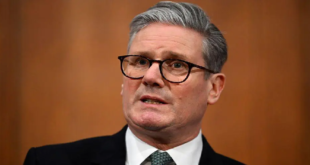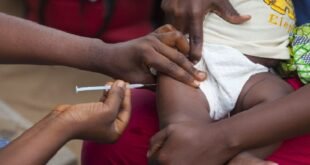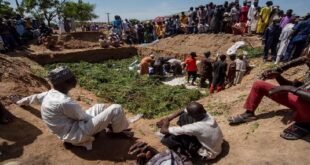13-04-2021
Bureau Report + Agencies
UNITED NATIONS/ RIYADH/ NEW DELHI: Akanksha Arora was fighting for survival in the emergency room after a traffic accident when she realized, in the face of death, what life is.
Arora said she was very lucky there was no damage to her internal organs, she was left with a broken leg and plenty of bruises after she was hit by a taxi but the potentially fatal accident made her realize she had to make some drastic changes in her life.
“God saved me for a reason. I asked myself: What have I done for the world?” Arora told media, adding it was then that she realized she had to make a difference.
 Arora joined the United Nations in 2016. Within two years, she felt the organization was failing the people it was created to help. In January 2019, she decided there was no better way to make a change than to lead it.
Arora joined the United Nations in 2016. Within two years, she felt the organization was failing the people it was created to help. In January 2019, she decided there was no better way to make a change than to lead it.
At 34, Arora is bidding to be the UN’s next Secretary-General (SG). If she succeeds, she will not only be the youngest person but also the first woman to lead the organization.
“The UN has let people down, it hasn’t served those who it is here to serve,” Arora said. “UN’s biggest enemy is its own inability to deliver. Decision-making is not the problem. It’s implementation that we’re falling short on. That has led to the loss in trust and credibility of the institution where people just don’t expect the UN to do anything.”
Diplomatic experience
On paper, her lack of diplomatic experience seems to hold her back as she prepares to launch her vision statement and rally support from member nations for the high-profile position currently held by someone more than twice her age, 71-year-old Antonio Guterres.
She acknowledges that gap but adds that diplomacy is not learned and mastered in conference rooms and political meetings alone.
 Born in India, she moved to Saudi Arabia aged six after her mother, a gynecologist, took up a job offer there. Three years later, she moved back to India for boarding school after her parents were unable to afford the only American school in the southwestern Saudi city.
Born in India, she moved to Saudi Arabia aged six after her mother, a gynecologist, took up a job offer there. Three years later, she moved back to India for boarding school after her parents were unable to afford the only American school in the southwestern Saudi city.
At 18, Arora was offered a scholarship at York University in Toronto for her undergraduate studies and stayed in Canada to work after finishing university. In 2016, she moved to New York to start work with the UN.
“This whole aspect of understanding and respecting people (while living in different countries and cultures) is diplomacy. It is, at the end of the day, caring for people, appreciating and embracing diversity and just having respect for everyone. That’s diplomacy.”
At the top of her priority list of global issues she wants to tackle is the refugee crisis, where she “envisages the UN to be a guardian for the refugees”.
According to the UN refugee agency, UNHCR, at least 79.5 million people around the world have been forced to flee their homes. Among them are almost 46 million IDPs and nearly 26 million refugees about half of them are under the age of 18.
“The UN has a responsibility to prioritize discussions around refugees. And to bring into focus that we can’t have these IDPs living in camps for a decade. That’s a 10-year lockdown.”
While climate, education, technology, and economic recovery post-COVID also make her priority list, Arora feels a lot of work needs to be done on women’s empowerment, at the organization she is part of as well as globally.
The UN has never elected a female secretary-general. In the last elections five years ago, seven out of 13 nominated candidates were women. While the current Deputy Secretary-General is Nigeria’s Amina Mohammed, Arora feels its “high time we show the world what women leadership can achieve”.
 “We’re 75 years too late in having a female chief. This candidacy is not just a test of my ability but also the UN. Do they really believe in gender equality and women empowerment or are these just words for them? What’s important is to practice what you preach.
“We’re 75 years too late in having a female chief. This candidacy is not just a test of my ability but also the UN. Do they really believe in gender equality and women empowerment or are these just words for them? What’s important is to practice what you preach.
“It’s a tough battle for women to demonstrate equality. It’s then a tougher battle as a young person to demonstrate competence and intelligence.”
Arora says her tough stance and striving for change stems from a very happy childhood and supportive parents.
Being the first female grandchild on her mother’s side after three boys she got extra love, especially from her grandmothers who she says were “both very strong women”. When choosing his life partner, her father, a microbiologist, wanted someone who would continue work after marriage, thus establishing the important role and status women would have in their house.
Arora says her father played a huge role in her upbringing, more so than her mother given the nature of their work. Arora was homeschooled in Saudi Arabia for three years. When, at the age of nine, she was sent to boarding school in India, Arora did not unpack for a few months, unable to adjust to life away from home.
“I would keep crying, I needed to go home. After two months, my dad said I can come back if I wanted but if I stayed, while life would be tough, it would only make me stronger. And that’s when I was like I’m totally going to stay, I won’t let anyone say I’m a weak girl.
“Boarding school was in its own a shock. But that’s when I grew from a child to almost an adult. That nine soon became 18.”
From changing diapers for her one-year-old brother when her parents were out when she was just seven to her time in India and then working as a barista and a statistics and economics tutor in her university days, Arora says experiencing cultures, people and religions around the world from an early age and living independently – has given her the some of life’s essential tools and skills.
At the elections, scheduled to take place in October, Arora hopes the organization will give a chance to “new perspective and fresh ideas” that she wants to bring in. But in order to get that chance, she knows she has to make history.
“I was really interested in history when I was homeschooled but I realized all the good history moments were taken. I asked my dad if I can make history now in any way.
“Just after I told them about my plan to run for the UN job, he reminded me of that conversation and said, not everything important has happened… you’re now in the process of shaping history.”
 Pressmediaofindia
Pressmediaofindia




